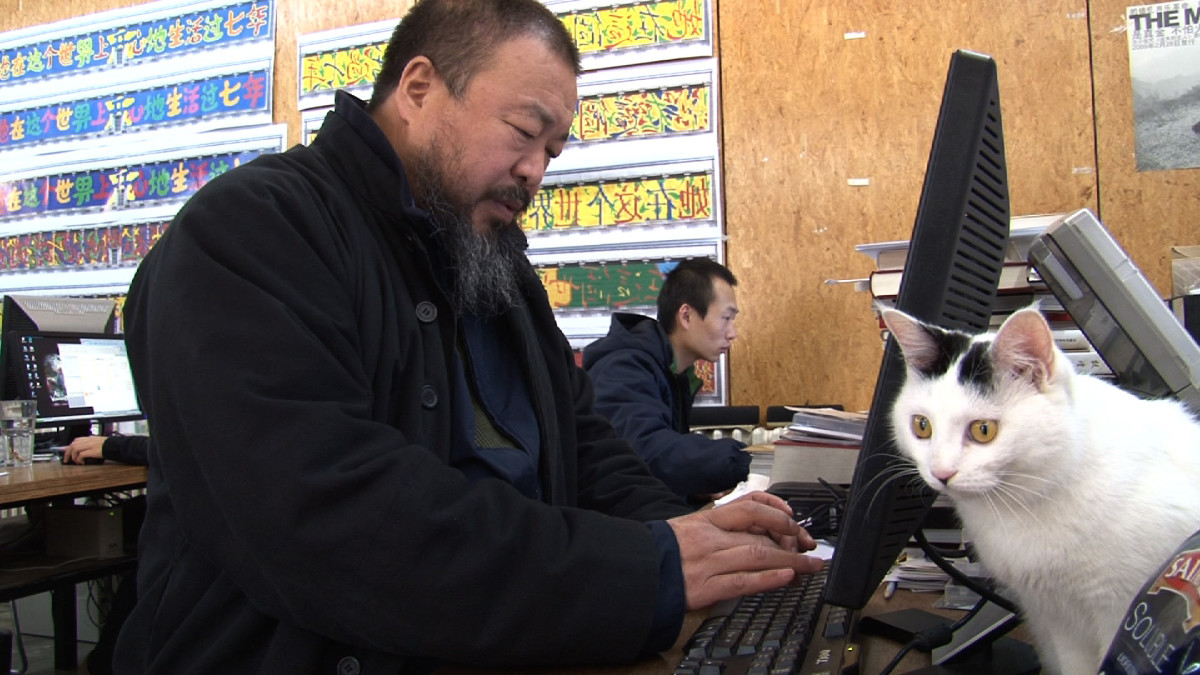Ai Weiwei: Never Sorry ends with the famously open Chinese artist refusing to speak. In a closing scene, Weiwei, just released after months in prison, stands before a flock of eager reporters and declines all interviews. “I can’t comment,” he says. The Chinese government has banned him from speaking to press or using social media. “So sorry,” he adds, before going inside his house and shutting the door.
But within months, as the end titles show, Weiwei is talking again. More importantly, he’s back on Twitter, the platform he uses to spread the anti-Communist opinions that have propelled him into the international spotlight. Weiwei truly is never sorry for speaking out about abuse of power, and Alison Klayman’s documentary—which covers the three years between Weiwei’s rise to Western prominence (as designer of the Beijing Olympics’ “bird’s nest” dome) and his mysterious 2011 disappearance—tries to explain why.
We see him post a picture of himself at the doctor’s office, moments after being told that the police attack caused brain swelling. Next, there’s a photo of him post-brain surgery, holding a bag of his own blood.
In many ways, it’s an old story: To Weiwei, nothing is more important than justice. Justice—freedom from censorship, accountability from government officials—won’t come without transparency.
Here is where protest melds with performance art.
Transparency, Weiwei thinks, is possible only if he feverishly broadcasts his every move; and so transparency wouldn’t be possible without the Internet, without video, without Twitter, which he calls beautiful and important. Though the film covers Weiwei’s past (the famous poet father, the decade in NYC) and his current oppression (the police surveillance, the razed studio razed, the taken-down blog), Twitter is the real heart of the work, the centerpiece of Klayman’s documentary about censorship versus freedom, and the blurring of art and activism.
All footage is interspersed with shots of Weiwei’s politically charged tweets, and the freedom of speech he displays on the site is even more meaningful given the repression he uses the site to criticize. He reports, gleefully, that jailed dissident Liu Xiaobo has received the Nobel Peace Price. He tweets support for activist Tan Zuoren, whom the government sent to prison after he blamed the deaths of schoolchildren in the Sichuan earthquake on shoddy building practice. Weiwei’s sense of justice extends to himself, as he promotes his own campaign to win damages for a 2009 assault.
That year, Weiwei—who had also been publicizing the records of children who died in the earthquake—traveled to Sichuan to testify at Zuoren’s trial. The night before the court date, police forced themselves into his hotel room and beat him to prevent his testimony. Klayman wasn’t there to record, but Weiwei does his own documentation, tweeting photos and videos of the attack. He never makes it to the trial.
The rest of the film follows Weiwei’s attempts to sue the police for harm, and his keen awareness of the importance of publicity. We see him post a picture of himself at the doctor’s office, moments after being told that the police attack caused brain swelling. Next, there’s a photo of him post-brain surgery, holding a bag of his own blood. The accompanying tweet calls out the officer who hit him.
Volunteers are told to tweet (and not just one of those really short tweets either) about confrontations, and Weiwei has a personal cameraman at all times recording visits to the police station, conversations with lawyers. The artist is fully aware that his attempts are futile, but goes through the motions anyway to show the harm of the close-lipped government.
Amidst this focus on activism, the art takes second stage. There’s glimpses of Weiwei’s more controversial work—him giving the middle finger to Tiananmen, a video of him saying “fuck you, motherland”—as the documentary follows preparations for European exhibitions, but the focus is less on formal installations than on the investigations and updates that have lent the artist cultural power.
The family members, artistic contemporaries, and Western commentators interviewed all praise Weiwei while worrying about where he’s going to end up. Weiwei himself says that he acts brave because he is “perhaps more fearful than others” about the consequences of passivity.
On camera, the artist is thoughtful, and at times personable, winking at the camera, bragging about how he confronted an officer and grabbed his sunglasses, talking fondly about the 40 cats in his Beijing studio. But when the subject matter veers into personal territory, he becomes more closed-off, and half-jokingly entreats people to interview a random woman pretending to be his mother instead of his real mother. Even more interesting is the detached, matter-of-fact way he addresses the situation surrounding his young son, who he had “not with [his] wife, but with a friend.” We see Weiwei visit the child, whom he sees almost every day. He plays with the boy, poses with him for pictures, even takes him to his Sunflower Seeds exhibit at the Tate Modern in London.
“But does your wife mind?” an interviewer asks. “Of course,” he responds. “I guess it is not desirable, but it happens.”
“You’re an artist, you’re allowed to do this,” the interviewer says. “Not really,” Weiwei responds. “Not really, you are not really allowed to do that.”
There are a lot of things that one is not really allowed to do in China. Clearly, Klayman shows, Weiwei does them anyway. He says that he think of himself as a chess player. He’s made his move—with his documentaries, his installations, and his tweets. Now, he’s waiting for his opponent.
The documentary Ai Weiwei: Never Sorry received a special jury prize at the 2012 Sundance Film Festival. It opens July 27.

